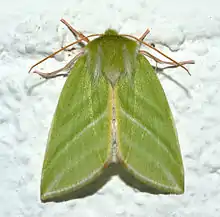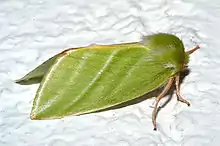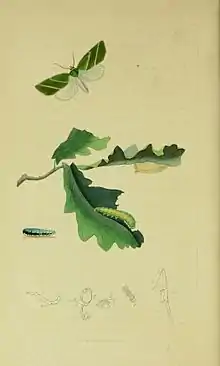| Pseudoips prasinana | |
|---|---|
 | |
| Scientific classification | |
| Domain: | Eukaryota |
| Kingdom: | Animalia |
| Phylum: | Arthropoda |
| Class: | Insecta |
| Order: | Lepidoptera |
| Superfamily: | Noctuoidea |
| Family: | Nolidae |
| Genus: | Pseudoips |
| Species: | P. prasinana |
| Binomial name | |
| Pseudoips prasinana (Linnaeus, 1758) | |
| Synonyms | |
| |
Pseudoips prasinana, the green silver-lines is a moth of the family Nolidae, common in wooded regions, and having a wingspan of 30–35 mm. It is found in the Palearctic realm (North and Central Europe, Russia, Siberia, Korea, Japan).



Technical description and variation
Forewing yellow green; costal edge pink, diffused towards apex; inner marginal area pink-suffused, except towards base; inner and outer lines oblique, darker green, conversely edged with white, the outer sometimes pink; subterminal line white, curved into apex: fringe pink with a white line at base; hindwing yellow; fringe pale pink, white at tips from apex to vein 2: abdomen white, dorsally suffused with yellow; in the female the abdomen is white, tinged with brown at base: forewing with costal edge white, and inner margin yellow; hindwing white. In the British form, subspecies P. p. britannica subsp. nov. (53 k), all the three lines are silvery white; the costal and inner margins in the male reddish only at apex and tornus respectively; in the ab. P. p. rufilinea ab. nov. (= ab. 2 Hmps.) (53 k) the outer line is marked with red. Larva apple green coarsely shagreened with yellow; the subdorsal line yellow; segment 2 red rimmed in front.[1] The wingspan is 30–35 mm.
Biology
The moth flies from June to July depending on the location stridulating on the wing. In August the larvae feed on oak, birch and several other deciduous trees.[2]
References
- ↑ Warren. W. in Seitz, A. Ed., 1914 Die Großschmetterlinge der Erde, Verlag Alfred Kernen, Stuttgart Band 3: Abt. 1, Die Großschmetterlinge des palaearktischen Faunengebietes, Die palaearktischen eulenartigen Nachtfalter, 1914
 This article incorporates text from this source, which is in the public domain.
This article incorporates text from this source, which is in the public domain. - ↑ Robinson, Gaden S.; Ackery, Phillip R.; Kitching, Ian J.; Beccaloni, George W. & Hernández, Luis M. (2010). "Search the database – introduction and help". HOSTS – A Database of the World's Lepidopteran Hostplants. Natural History Museum, London.
Further reading
- South R. (1907). The Moths of the British Isles, (First Series), Frederick Warne & Co. Ltd., London & NY.
External links